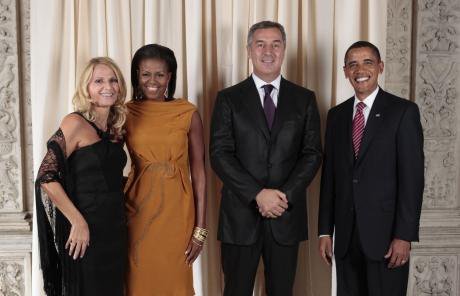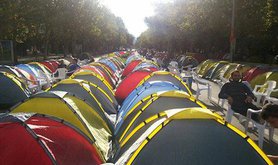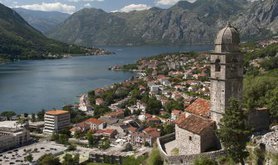
Prime Minister Milo Djukanovic, and his wife, meet the Obamas. US Federal Government photograph. Public Domain.
It is interesting that many foreign dignitaries and politicians, including the former Pentagon spokesman, J.D. Gordon, as well as the current NATO Secretary General, Jens Stoltenberg, chose this time to speak about the obligations associated with the NATO membership and the criticize power structure of Montenegro - a country poised to become its newest member.
The former spokesman for the Pentagon was very critical of the Prime Minister, Milo Djukanovic, but his criticism betrayed a desire to pressure Djukanovic into making a number of political concessions not related to NATO membership. Jens Stoltenberg, on the other hand, was more reserved in his comments but referred to the same issues as J.D. Gordon: the rule of law and corruption in Montenegro. Both comments sounded very much like a pressure tactic to influence the course of the ongoing reshuffling of Djukanovic’s cabinet.
After surviving the no confidence vote in the rump parliament of Montenegro, Djukanovic was pressured into bargaining with some of his former critics about letting go of a few ministerial posts. Those who are taking part in the negotiations with him refer optimistically to the process as seeking ways to create the “government of electoral trust.” It is, however, difficult to escape the sense of this being anything but yet another political maneuver by Djukanovic aimed at silencing political actors of minor stature by including them in his cabinet, and marginalizing his most significant political opponent: Democratic Front.
Truth be told, what we are witnessing in Montenegro is an effort to implement cosmetic changes to a deeply corrupt and some would say criminalized power structure, and keep Djukanovic in charge at all cost. This is being done with the approval of and under the watchful eye of the foreign diplomats in Montenegro. It is all about a form that appears new and reformist so that the content remains unchanged and untouched. This, I believe, is the context in which criticism by J. D. Gordon and comments by Jens Stoltenberg should be interpreted. Those comments are problematic on many levels but I will address what I consider to be two of the most pressing issues.
First a reminder about the nature of NATO. Despite the rhetoric to the contrary, this is a military alliance whose primary task is to serve the interests of its most powerful members. Stoltenberg’s statement about the Western alliance “not interfering in the internal affairs” of Montenegro (or other countries in the region, for that matter) is the proof of his highly developed sense of irony. The reality is that the history of NATO’s actions worldwide serves as the most potent counter-argument.
The persistent narrative about NATO as a tool of democratic change is flawed at best. Some of the NATO-member states could hardly be called democracies. To deconstruct such concocted narrative one needs only to look at the consequences of various military interventions of this alliance. Almost without exception, all post-NATO intervention environments have been characterized by political instability, the rise of sectarian violence and of ethnic and religious animosity as well as the emergence of highly criminalized kleptocracy that plunders resources of a given country. More often than not, the remaining in power of such kleptocracy has been directly linked to a constant material and political support by NATO in general and its most powerful member, the United States, in particular. Montenegro is the case in point.
Second, and in fairness to both, J.D. Gordon and Jens Stoltenberg, their criticism of the Montenegrin government and Milo Djukanovic is well-founded. The political system in Montenegro created by Djukanovic is deeply corrupt. The political party he leads, the Democratic Party of Socialist (DPS), controls the entire state apparatus and uses it exclusively to achieve party goals.
It is also true that for many years the officials from the EU, the United States, and NATO were aware of all the shady dealings and political corruption Djukanovic and his party have been engaged in. The American DEA has been rather active in both monitoring and sometimes suppressing activities of Djukanovic’s political supporters and donors whom he referred to as friends and “good people.” Some of them had been involved in coordinating cigarette and cocaine smuggling on a large scale. It is well known in Montenegro and in the region that the successive U.S. administrations as well as the EU administration in Brussels have been landing their unconditional support behind Milo Djukanovic and his party.
Leveling criticism against Djukanovic at this time could, therefore, be perceived as somewhat disingenuous. This is particularly true if we remember that in the past criticism had been voiced almost exclusively when it suited particular agendas of the administrations in Washington and Brussels.
The most disheartening part of the whole thing is that the purpose of this criticism is not to initiate genuine and systemic reforms of a deeply problematic political system in Montenegro. Its aim is to achieve precisely the opposite: to keep Djukanovic in control of the very system that had produced corruption, organized crime with high level of political influence, impotent judiciary, absence of the rule or law, and much, much more. It is regrettable that foreign diplomats in the region incorrectly see the ongoing reshuffling of Djukanovic’s cabinet as their tactical victory over the only truly reform-oriented political force in Montenegro – the Democratic Front.
Those in Montenegro and abroad who work hard on keeping Djukanovic in power remain blind to the long-term negative consequences of their actions. Supporting an autocrat like Djukanovic and turning a blind eye to his building of the stabilitocracy in Montenegro, while at the same time preaching about democracy, free and fair elections, security, stability, and the rule of law is not the best way to build partnerships. It is, however, a shortcut to deepening the existing resentment in Montenegro towards foreign political actors influencing political decisions that were supposed to be made independently and at home. Discussing such decision in English and on the western shores of the Atlantic Ocean only worsens the situation.
The usual explanation for an unconditional support to Djukanovic could be summed up in a weak and, above all, false argument: the alternative to his rule is worse than he is. In the New Cold War framework all of his political opponents constituting the Democratic Front (DF) coalition have been unjustly branded as pro-Russian. Even though the constituents of this coalition differ considerably on the questions of NATO membership and the role of Russia in the region, Djukanovic supporters chose not to recognize that fact. As a consequence of this 'single and broad political brush' approach to Montenegro, the DF's calls for systemic reforms have been largely delegitimized. On the other hand, those of us who have been studying the region for many decades know that such argument has no bases in reality but is born out of ideological single-mindedness and political myopia.
The alternative to Djukanovic exists and political representatives of such alternative have been trying for some years to solicit the support of the U.S. administration as well as the one in Brussels for their plans to enact systemic change in Montenegro. Such seeking of support has been bouncing off a wall - united and uniform front of Djukanovic supporters in both Washington and Brussels. What is now criticized in Montenegro has been, in large measure, the product of the support and encouragement which came from those two political centers. The “64 thousand dollar” question is for how long and at what price would this trend continue?
Read more
Get our weekly email


Comments
We encourage anyone to comment, please consult the oD commenting guidelines if you have any questions.